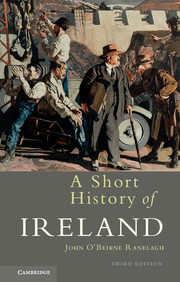Book contents
- Frontmatter
- Contents
- List of figures
- Preface to the first edition
- Preface to the second edition
- Preface to the updated edition
- Preface to the third edition
- Map of Ireland: The Pale and the Irish plantations
- Chapter 1 Beginnings
- Chapter 2 Ascendancy
- Chapter 3 Union
- Chapter 4 Home rule?
- Chapter 5 Rising
- Chapter 6 South
- Chapter 7 North
- Chapter 8 Another country
- Appendix Timeline of Irish history
- Select bibliography
- Index
Preface to the second edition
Published online by Cambridge University Press: 05 November 2012
- Frontmatter
- Contents
- List of figures
- Preface to the first edition
- Preface to the second edition
- Preface to the updated edition
- Preface to the third edition
- Map of Ireland: The Pale and the Irish plantations
- Chapter 1 Beginnings
- Chapter 2 Ascendancy
- Chapter 3 Union
- Chapter 4 Home rule?
- Chapter 5 Rising
- Chapter 6 South
- Chapter 7 North
- Chapter 8 Another country
- Appendix Timeline of Irish history
- Select bibliography
- Index
Summary
Preface to the second edition
Since I wrote this book twelve years ago, there has been a great change in mainstream Irish nationalism and in the awarenesses of the Republic. Roman Catholic moral and social teaching, militating against contraception, divorce, abortion, pushing Ireland apart from the liberal values at the heart of the European Union, have given way to a more secular sensibility. American Catholic attitudes have replaced traditional Irish ones: there is hostility to Church leadership and control. There is a general indifference to traditional Gaelic culture. Terror has become a way of life for malcontents in the North, of which terrorists are a part. They have confirmed their debasement of a struggle that was noble and have fundamentally conditioned Irish nationalism and unionism for most Irishmen. Very few of the men and women involved in the Irish fight for freedom in the 1916–21 period could identify with those who act in the name of the IRA and its splinter groups today. Unionists of the same period would undoubtedly reject those ‘loyalists’ who have also chosen terror as a weapon.
The balance of this book is weighted to the period after 1800 in which modern Ireland has been formed. Terrorism and its attendant horrors in Northern Ireland, spilling at times into England and the Republic – and even occasionally further afield – have forced the Republic effectively to moderate its claims to the whole island of Ireland. At the same time, the less organic, federal and provisional nature of the union between Northern Ireland and Britain (i.e., England, Scotland and Wales) has become steadily clear as United Kingdom (i.e., Britain and Northern Ireland) governments have committed themselves to observe only majority verdicts by voters within the North on the future of the province, and not to consider the views of British voters on the matter. Indeed, Westminster governments and the people of Britain by no means crave possession of Northern Ireland: unionists in the North are acutely conscious of this. Assertions to the contrary are a combination of misrepresentation and misappreciation that now suits terrorists and their supporters. Similarly, in the Republic, people are conscious that Irish unity will involve terrible costs that they are by no means certain they wish to pay.
- Type
- Chapter
- Information
- A Short History of Ireland , pp. xi - xiiiPublisher: Cambridge University PressPrint publication year: 2012



